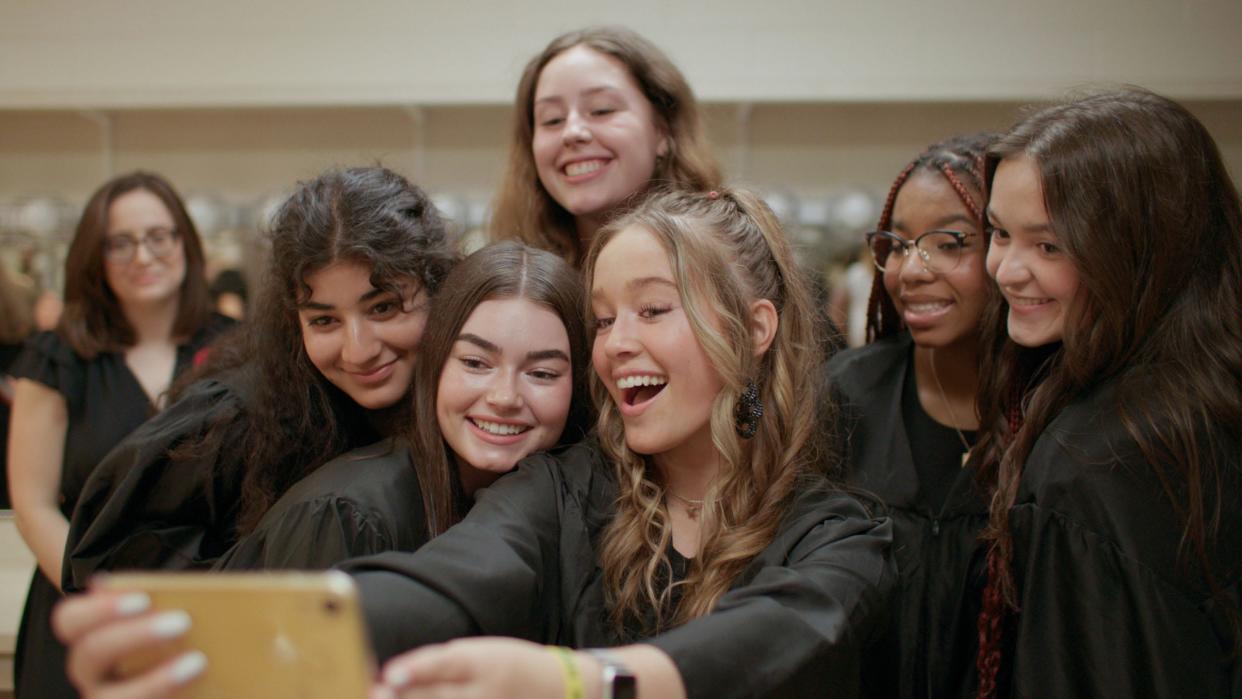Missouri students lead 'Girls State' into True/False. Our Q-and-A with the directors

- Oops!Something went wrong.Please try again later.
- Oops!Something went wrong.Please try again later.
- Oops!Something went wrong.Please try again later.
True/False Film Fest patrons this weekend will get multiple chances to see “Girls State,” sure to be one of the best documentaries of 2024.
It’s about the titular program — run in all 50 states — where hundreds of high schoolers entering their senior years spend a week campaigning for office, building a government, and generally trying to solve the synthetic versions of problems faced by our country at-large.
At the same time, they learn about themselves at a formidable juncture.
What makes “Girls State” of specific interest to Columbia is the fact that the filmmakers — Jesse Moss and Amanda McBaine — picked Missouri’s program for their cinematic canvas. In addition to being a compelling and entertaining doc, you can get a jolt of excitement identifying the high schools on the girls’ shirts or chuckling at sights captured from the Franklin County Fair.
If you’re a True/False regular, the concept will sound similar. That’s because Moss and McBaine also helmed “Boys State” from several years back. It’s the same program as described above, with some Y chromosomes thrown in. That doc was filmed in Texas and brilliantly captured how the fractured state of Trump-era politics seeped into the high school landscape.
With “Girls State,” the documentarians caught sight of not only the week-long lesson in civics, but also witnessed their subjects struggling — either consciously or not — with the pending Dobbs decision that would be decided within a week of the girls returning home. That audiences see these young women discussing how that case would impact the future makes this film one for the history books.
I spoke with Moss and McBaine prior to their return to the Show-Me State to talk about the film and its subject and why it’s different from “Boys State.” The interview is edited for clarity and length.
I first have to ask: Why Missouri?
Moss: We auditioned states and needed to find programs willing to allow our crew into their space, but also places that were politically interesting. With Missouri, you have Cori Bush and Josh Hawley. That was exciting.
McBaine: This was also the first program in the country where Girls State and Boys State would be held at the same time on the same campus. (Note: Both were conducted at Lindenwood University in St. Charles.)
How did you pick the subjects you followed?
Moss: Lots of shoe leather. Zoom meetings with the girls and the families. We wanted to pick people from different political backgrounds and different parts of the state. When we were trying to narrow it down, we visited them. We went to the Eldon prom and saw where some kid had rented an 18-wheeler like others rented a limo.
McBaine: (Laughs) That’s a whole other movie.
For those who have seen “Boys State,” why is this movie different?
McBaine: We didn’t want to make “Boys State” ... starring girls. We wanted to explore femininity and coming-of-age at this time. Representation becomes more interesting because civics is not an equal space. There is no female president to emulate. Fewer leaders. The question becomes: how does that reality play out with these women? Dobbs was at the top of our mind and the women’s mind and still is.
Moss: It’s loaded.
McBaine: Especially when they were picking out their Supreme Court candidates.
Moss: Another thing is this is four years later. Sharing views (is) more contentious. How does that affect how girls build a state? How do girls do politics with each other at this time in history and as young women? That is interesting to see. They have internalized expectation and external constraints. This is a sibling, not a sequel, to “Boys State.”
What is the takeaway you hope people have from “Girls State”?
McBaine: I have my takeaway. I hope others have their takeaway. Making the invisible visible is my takeaway. There is a story every woman will recognize. So few stories where this happens and (we) see kids deal with it and have an awakening from it. What does it say about the country?
Moss: The film embodies the contradictions we feel. There’s frustration. Disappointment. Limits of opportunities to women and representation. But there’s ambition to their intelligence and optimism. It’s a reflection of a place and a time, of a moment.
You’ve been coming to True/False as filmmakers since almost the beginning. What do you like about the festival?
Moss: It celebrates and promotes documentary. We like that it has an expansive vision of “documentary.” Small and broad without orthodoxy. The festival has grown this incredible audience. Maybe “grown” is the wrong word. “Tapped into” is better.
McBaine: It’s very joyful. What’s great about this year is many of the women will be there because they go to MU. They can leave their dorm room and become stars at Jesse Hall. Family members will be there. It’s going to be a real homecoming.
"Girls State" screens at 4:15 p.m. Thursday at Jesse Auditorium; 2:30 p.m. Saturday at Jesse; and 12:30 p.m. Sunday at Missouri Theatre. If you miss it, the documentary from Apple Original Films will premiere on Apple TV+ April 5.
Learn more at https://truefalse.org/.
James Owen is the Tribune’s film columnist. In real life, he is a lawyer and executive director of energy policy group Renew Missouri. A graduate of Drury University and the University of Kansas, he created Filmsnobs.com, where he co-hosts a podcast. He enjoyed an extended stint as an on-air film critic for KY3, the NBC affiliate in Springfield, and now regularly guests on Columbia radio station KFRU.
This article originally appeared on Columbia Daily Tribune: Missouri students guide 'Girls State' in core True/False doc

